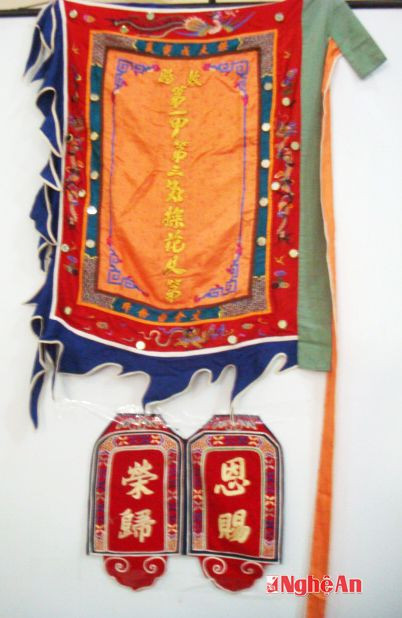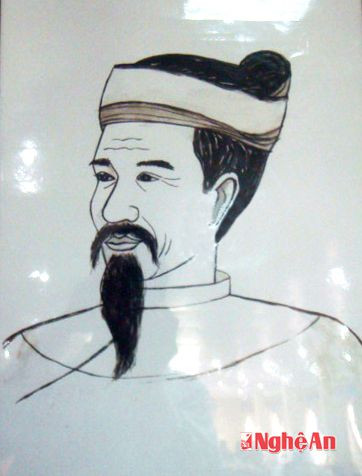Third place winner Phan Thuc Truc
(Baonghean) - Phan Thuc Truc (1808 - 1852), also known as Phan Duong Hao, Phan Su Manh, alias Hanh Quy, Cam Dinh, Duong Hao Hien, was from Van Tu village, Dong Thanh district, now Khanh Thanh commune, Yen Thanh district.
 |  |
| Third place winner Phan Thuc Truc. |
He was born into a Confucian family - a family with many generations of Huong Cong, Sinh Do and mandarins under the Le dynasty. His father, Phan Vu, passed the first three Bachelor exams of the Nguyen - Gia Long dynasty, and was called Tu Men. Phan Thuc Truc was directly taught and trained by his father, and was naturally diligent and studious, so from a young age he was famous as the "Child Prodigy" of Nghe An. He read many books and was well-versed in the classics and history, was famous for his good writing, passed the Dau Xu exam (at the age of 16) and many other Bachelor exams, so he was honored by the Literature Association of Dong Thanh district with a pair of parallel sentences:
"One move to become famous in the world;
The ten sciences are inseparable from the world.
Mean:
"Once passed the Bachelor's exam, there was such a person in the world;
"Ten exams passed, no one in the world has ever passed".
He was selected by the royal court to study at the Imperial Academy to take the Royal Examination. In the year of Dinh Mui - Thieu Tri 7 (1847), he passed the examination with the first class rank and third rank (Dinh Nguyen, Tham Hoa). On the day of his return to honor his ancestors, the king bestowed upon him the title "Khoi Da Sy" (meaning: The person who passed the examination with the highest rank among many scholars).
His life is a shining example not only in studying, passing exams and becoming famous, but also in loving the country, loving the people, and being devoted to work. He always cared about education, taught in many places and took care of the spiritual development of the younger generation. After passing the exam, he returned to his hometown to direct the dredging and damming of Cam Giang to get water for irrigation of the fields, develop agriculture, and help people stabilize their lives. Therefore, after his death, the local people built a temple to worship him as a god of fortune. He was praised by many people for his education and virtue. The book Dai Nam Chinh Bien Liet Truyen wrote about him:
“Phan Thuc Truc was from Yen Thanh, Nghe An, his ancestors passed the Huong Cong exam in the Le dynasty for four or five generations. His father, Vu, met during the late Le dynasty and studied in seclusion. Then, at the beginning of the Gia Long era, he went to school many times to teach, and he recited the classics and history by heart every day. People respected him as a learned mandarin. Thuc Truc studied at home with his father. He was intelligent, had a broad knowledge, and was famous for his good writing. After a long time, he was always rejected by the mandarins when he took the Huong exam. Truc then took the position of Tu Tai, a tribute student, and studied at the Quoc Tu Giam School. In the 7th year of Thieu Tri (1847), he passed the First Class Doctorate, third place, and was appointed to the Han Lam Academy. In the first year of Tu Duc (1848), he was appointed to the Cabinet, then promoted to Tap Hien Vien Thi Doc, who was appointed to Kinh Dien Khoi Cu Chu. He obeyed orders to write poems and prose, and was always praised by the king. In the 4th year (1851), he obeyed the royal decree to go to the North to search for remaining ancient books. The following year, when he returned to Thanh Hoa, he fell ill and died. He was posthumously awarded the title of Thi Giang Hoc Si.
Before that, the hamlet where Thuc Truc lived had a strip of the Cam Giang River, which flooded every year, causing many fields to become swampy, overgrown with grass, and uncultivable. After returning from his studies, Thuc Truc helped the people dig piles and build dams. From then on, water was stored and drained conveniently, which benefited the people. After his death, the people in the hamlet remembered his gratitude and built a temple to worship him. His first name was Duong Hao, then he took the given name Hanh Quy. His son was Vinh, who passed the Bachelor's degree; Dinh, and Tu Tai.
He died early at the age of 43, but managed to leave behind for posterity valuable documents: Cam Dinh Literature Collection; Cam Dinh Poetry Collection; Cam Dinh Poetry Complete Works; Tran Le Foreign Stories; National History Di Bien...
He was a person who loved books, always read books since childhood and was well-versed in the Four Books, Five Classics, and History. He also had the talent to improvise poems and prose, and was praised and rewarded by the king many times. He was loved by the king, always by his side to help with the work of Kinh Dien Khoi Co Chu, in the Privy Council. Before that, he had held positions related to books, education, and document compilation: Han Lam Vien, promoted to Thua Chi, Nhap Noi Cac, Tap Hien Vien. Perhaps because he was so passionate and well-versed in history, King Tu Duc sent him and Nguyen Do Tich to collect documents in the Bac Ha provinces for the court. Phan Thuc Truc was truly worthy of the compliment that the Tham Tri Truong Quoc Dung gave him: "A plum branch above a hundred flowers" (Bach hoa dau thuong nhat chi mai).
Dao Tam Tinh
